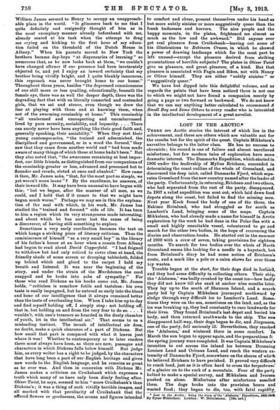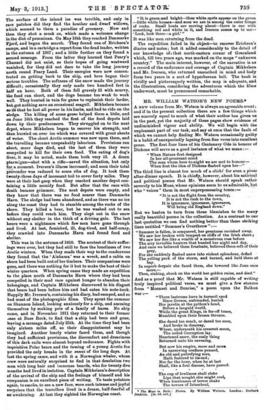LOST IN THE ARCTIC.•
THERE are Arctic stories the interest of which lies in the achievement, and there are others which are valuable not for
the results but for the spirit of the quest. Captain Mikkelsen's narrative belongs to the latter class. He has no success to chronicle ; his record is one of failure and almost unrelieved misfortune; but few modern tales of exploration have more dramatic interest. The Danmarks Expedition, which started in 1906 under the leadership of Mylius Erichsen, succeeded in determining the coast outline of the whole of Greenland, and discovered the deep inlet, called Danmarks Fjord, which sepa- rates Greenland from the new country named after the leader of the party. Unfortunately, in returning, Erichsen and two others, who had separated from the rest of the party, disappeared. In 1907 a relief expedition was sent out, which laid down food depots along the coast, but failed to find the missing men. Next year Kock found the body of one of the three, the Eskimo Brinalund, who had struggled as far south as Lambert's Land, bringing some of the maps. Captain Mikkelsen, who bad already made a name for himself in Arctic exploration by the work he had done in the Polar Sea with a small and highly unsuitable vessel, volunteered to go and search for the other two bodies, in the hope of recovering the diaries and observation-books. He started out in the summer of 1909 with a crew of seven, taking provisions for eighteen months. To search for two bodies over the whole of North Greenland seems like looking for a needle in a haystack, but from Bronlund's diary he had some notion of Erichsen's route, and a mark like a pole or a cairn shows far• over those icy wastes.
Trouble began at the start, for their dogs died in Icebind, and they had some difficulty in collecting others. Their ship, the ` Alabama,' was badly crushed by the coast ice—how badly they did not know till she sank at anchor nine months later. They lay up to the south of Shannon Island, and a search party led by Captain Mikkelsen 'journeyed northward by sledge through rery difficult ice to Lambert's Land. Some- times they were on the sea, sometimes on the land, and, as the ice was breaking up, they had constantly to race landwards for their lives. They found Bronlund's last depot and buried his body, and then returned southwards to the ship. The sun disappeared half-way, their dogs began to die, and Jorgensen, one of the party, fell seriously ill. Nevertheless, they reached the 'Alabama,' and wintered there in some comfort. In March the sun began to appear again, and the preparations ft the spring journey were completed. It was Captain Mikkelsen's intention to cut across the inland ice between Dronning Louises Land and Orleans Land, and reach the western ex- tremity of Danmarks Fjord, somewhere on the shores of whiPix he believed Erichsen to have perished. It proved very difficult to reach land, just as it is often hard to cross the bergsehrum: of a glacier on to the rock of a mountain. Four of the part) halted to make a special survey, and Mikkelsen and Iversen pushed on alone. Misfortune after misfortune assailed them. The dogs broke into the provision boxes and wasted food ; they began to die, too, with fatal rapidity.
• Lost in the Arctic being the story of the `Alabama' Expedition, 1801bitt1i By Ejner Mikkelsen. London W. Heinemann. ClEss:netj
The surface of the inland ice was terrible, and only in rare patches did they find the heather and_ dwarf willows, which seemed to them a paradise of greenery. Now and then they shot a musk ox, which made a welcome ohange in the diet of pemmican. On May 18th they reached Danmarks Fjord, and began the search. • They found one of Erichsen's camps, and in a cartridge a report from the dead leader, written in the autumn of 1907 ; and a little further on they found a second message. From the latter they learned that Peary's Channel did not exist, so their hopes of going westward vanished, for they did not dare to take the long journey north round Peary Land. Their energies were now concen- trated on getting back to the ship, and here began their serious troubles. The softness of the snow made the journey difficult; occasionally they only made two hundred feet in half an hoar. Both of them fell gravely ill with scurvy, the food ran short, and the dogs became too weak to work well. They hunted in vain for game to replenish their larder, but got nothing save an occasional seagull. Mikkelsen became so ill-that he lost all power in his limbs, and had to ride on the sledge. The killing of some geese helped them a little, and on June 16th they reached the first of the food depots laid down by their predecessors. They struggled on to the next depot, where Mikkelsen began to recover his strength, and then hurried on over ice which was covered with great sheets of water. The short Arctic summer was now upon them, and the travelling became unspeakably laborious. Provisions ran short, more dogs died, and the last of them they were compelled to kill for their own food. The eating of dog's liver, it may- be noted, made them both very ill. A dozen ptarmigan—shot with a rifle—saved the situation, but only for a moment,. Iversen's illness increased; and soon their total provender was reduced to some ribs of dog. It took them twenty-three days of incessant toil to cover forty miles. They were at their last gasp when they reached another depot con- taining a little mouldy food. But after that the race with death became grimmer. The next depots were empty, and they knew that there was no food nearer than Danmarks Havn. The sledge had been abandoned, and as there was no ice along the coast they had to stumble among the rocks of the shore. They killed a bear, but he was washed out to sea before they could reach him. They slept out in the snow without any shelter in the thick of a driving gale. The last hours were a nightmare which few men have gone through and lived. At last, famished, ill, dog-tired, and half-crazy, they crawled into Danmarks Havn and found food and shelter.
This was in the autumn of 1910. The acntest of their suffer- ings were over, but they had still to face the loneliness of two Arctic winters. When they made their way to the rendezvous they found that the ' Alabama' was a wreck, and a cabin on shore had been built out of her timbers. Their companions were gong, and there was nothing for it but to make the best of their winter quarters. When spring came they made an expedition to the place north of Danmarks Havn where they had been compelled in their mad race against hunger to abandon their belongings, and Captain Mikkelsen discovered to his disgust that bears had been before him and bad eaten his note-book. Happily Mr. Iversen's, containing his diary, had escaped, and so bad most of the photographic films. They spent the summer on Shannon Island, looking anxiously for a ship, and amusing themselves by making pets of a family of hares. No ship came, and in November 1911 they returned to their former oase at Bass Rock, to find that a ship had been and gone, leaving a message dated July 25th. At the time they had been only sixteen miles off, so their disappointment may be imagined. Another lonely winter faced them, and though they had sufficient provisions, the discomfort and dreariness of this dark exile were almost beyond endurance. Fights with inquisitive Polar bears and the taming of a young Arctic fox provided the only breaks in the ennui of the long days. At last the spring came, and with it a Norwegian whaler, whose crew were naturally surprised to find in that desolation two men with long hair and immense beards, who for twenty-five months had lived in isolation. Captain Mikkelsen's description of .the arrival of the ship and the feelings of himself and his companion is an excellent piece of writing. To taste potatoes again, to smoke, to see a new face, were such intense and joyful surprises that the travellers lived in a dream, half-fearful of an awakening. At last they sighted the Norwegian coast.
"It is green.-and bright—then white spots appear on the green —little white houses—and soon we are in among the outer fringe of rocks. Small boats are moving about—there is one with something red and white in it, and Iversen comes up to me— Look, look there—a girl.' " It was like men returning from the dead.
The expedition failed in its object—to recover Erichsen's diaries and notes ; but it added considerably to the detail of our knowledge of. that north-eastern corner of Greenland which, till two years ago, was marked on the maps " unknown country." The main interest, however, of the narrative is as a record of the endurance and courage of Captain Mikkelsen. and Mr. Iversen, who returned unscathed in mind and body from two years in a sort of hyperborean hell. The book is vividly and picturesquely written, the map is adequate, and the illustrations, considering the adventures which the films underwent, must be pronounced remarkable.



















































 Previous page
Previous page